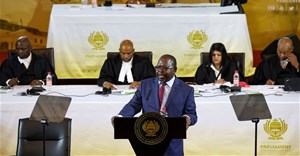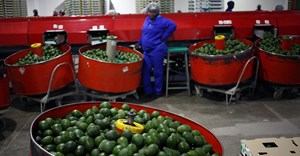Trending




 Sabre EMEA 2024 Awards: Razor PR, Retroviral top SA agenciesDanette Breitenbach
Sabre EMEA 2024 Awards: Razor PR, Retroviral top SA agenciesDanette Breitenbach
Elections 2024
Jobs
- Admin and Finance Coordinator Cape Town
- Debtors and Creditors Clerk Pretoria
- Junior Project Manager George
- Finance Clerk Nelspruit
- ParaPlanner Kloof
- Documentation Specialist George
- Financial Manager Launda
- Sales Manager Johannesburg
- Financial Graduate George
- Accountant Cape Town
MTBPS focus: managing Eskom remains key

The MTBPS will be closely scrutinised for its commitment to improving the lot of ordinary South African's who have been left struggling after the economic jolts of the pandemic lockdowns, which by no means can be considered a thing of the past just yet.
While the focus is on the consumer, we need to be cognisant that the consumer's fortunes are by their very nature directly linked to the economy's fortunes.
For this reason, the minister's focus should be on measures to support the revival of the economy.
The MTBPS in all likelihood will not see the announcement of any major changes but continued focus on what will support growth is important because of the significant challenges still faced by the economy.
Some good news
There's some good news in that revenue collection is improving, thus boosting the government's coffers somewhat.
With the IMF revising SA's GDP forecast to 5% for this year, higher than the 3,3% Treasury had pencilled in during the February Budget Speech, the key metrics that rating agencies look for are better.
This includes the gross debt to GDP ratio and the budget deficit ratio.
Since this improvement is not due to less borrowing and expenditure, it's critical that fiscal prudence continues.
And that the economy continues to grow, which is why managing Eskom is key. This might buy us time with the rating agencies.
Electricity shortages
Along with the unexpected pandemic, electricity shortages continue to bedevil the smooth running of businesses, not to mention everyday life.
Then there are record fuel price increases which will add real pressure to inflation and is something that is already weighing heavily on ordinary consumers in their already burdened pockets.
The minister should shed light on measures to ease the electricity supply problems as this creates a bottleneck to production and is detrimental to investor and rating agencies' confidence.
Further clarity on private power producers would be great. This and government supporting the use of renewable energy.
Formal employment
Formal employment, excluding agriculture, is now below 2009 levels, largely due to the pandemic. It's important that the minister lays out concrete measures to address this.
Rating agency confidence
Rating agency confidence will also be based on the continuation of what government has committed to under the previous minister: structural reforms, revitalising state-owned enterprises, and containing the public sector wage bill.
The government's substantial wage bill is always a bone of contention - and the question is whether the minister is going to continue with what Mboweni started by reigning it in so government can find more money for other things.
Relief for consumers
Measures that are directly related to consumers would focus on how to continue to provide relief from the ravages of the pandemic.
There has been talk about a proposed basic income grant.
However, with over seven million South Africans unemployed, excluding discouraged job seekers, this would add substantially to expenditure and will actually undermine the improvement in debt to GDP ratio.
Beyond this, it will be interesting to see what form other measures could take and how they are funded given the current circumstances.
This will be the real test to see if government are fully committed to their promises of implementing meaningful measures to revive the economy and give hope to ordinary people who certainly need all the help they can get right now.











